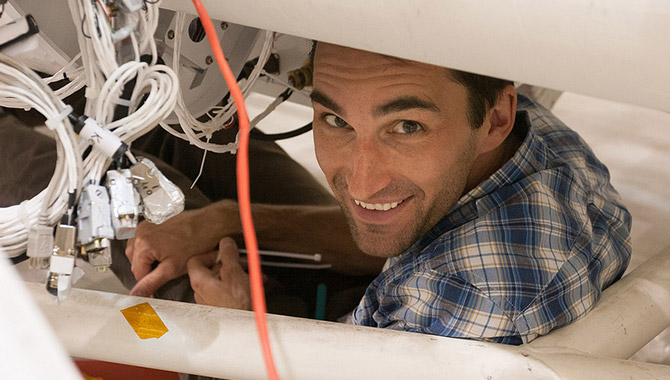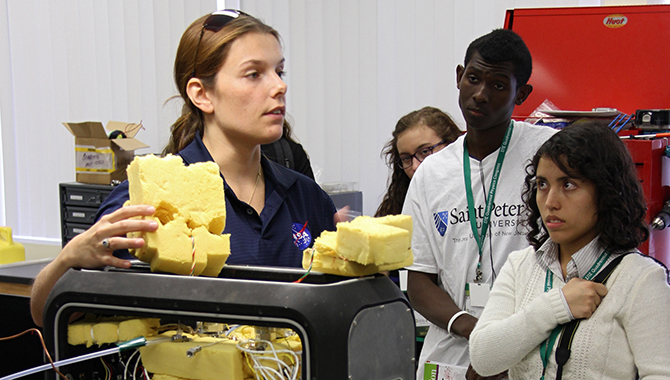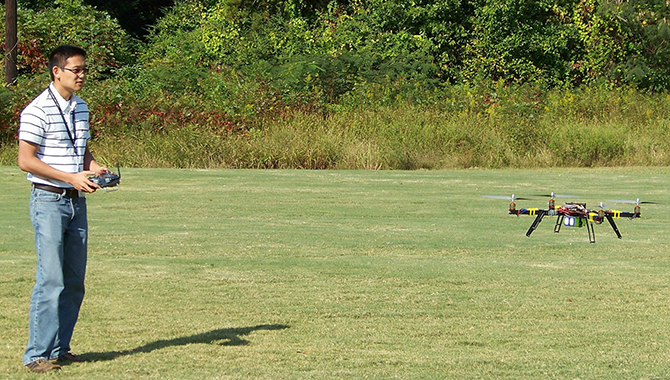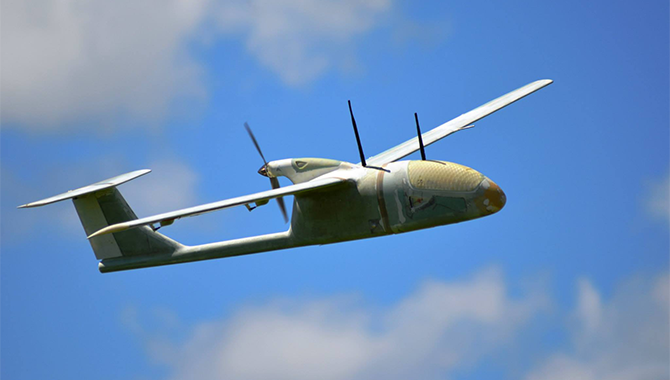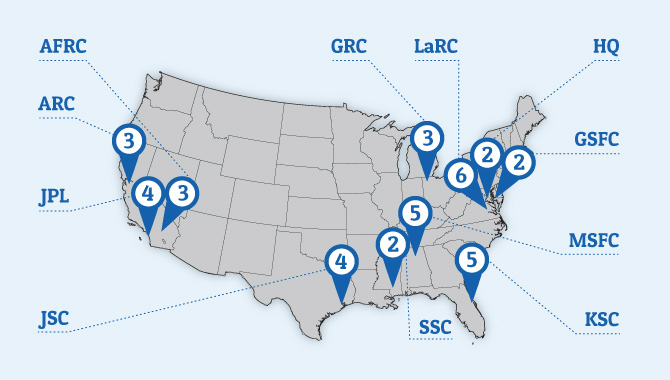
For the third quarter of FY 2017, APPEL is offering a range of courses designed to support the development goals of agency practitioners. The visual above indicates the number of APPEL courses offered at each NASA center.
For the third quarter of fiscal year (FY) 2017, APPEL is offering a range of courses designed to support the development goals of NASA practitioners at all career levels.
APPEL courses are specifically designed to address the training objectives of the agency’s technical workforce.
Courses are completely NASA-centric and fully relevant to the project and mission needs of the agency. What’s more, participants rate APPEL courses highly: each has been ranked 4.0 or higher, out of 5.0, by past attendees.
For the upcoming quarter, which begins on April 3, 2017, APPEL will deliver 38 distinct course offerings across NASA centers. The courses span a spectrum of subjects, from foundational topics in project management and systems engineering to more in-depth concentrations on mission-relevant disciplines such as requirements development, cost estimation, mission design, and more. Other courses emphasize the softer skills that are critical for leadership, helping practitioners enhance their negotiation, communication, or strategic-thinking abilities.
Courses for NASA practitioners to consider this quarter include:
Introduction to Software Engineering (APPEL-ISWE) at the Jet Propulsion Laboratory (JPL):
- Software lends capability and flexibility to NASA flight projects—without adding weight. This NASA-centric course, which is taught by agency civil servants, gives participants an overview of software development mapped to the NASA Project Life Cycle.
Leading Complex Projects (APPEL-LCP) at Armstrong Flight Research Center (AFRC) or Kennedy Space Center (KSC):
- This highly rated course—part of APPEL’s project management suite of courses—introduces the concepts, tools, and techniques used to manage complex projects. To reinforce learning, the course leverages a NASA-based case study so participants can apply concepts learned in the classroom to a real-world situation.
Science Mission & Systems: Design & Operations Lab (APPEL-SMSDO-LAB) at Goddard Space Flight Center (GSFC):
- Systems engineers and subsystem leads benefit enormously from this hands-on course, which provides a full spacecraft mission design and operations development experience.
Strategic Thinking for Project Success (APPEL-STPS) at Ames Research Center (ARC). NASA Headquarters (HQ), and Langley Research Center (LaRC):
- Consistently rated highly by participants from all centers, this course introduces the concepts and methods needed to use strategic thinking as a foundation for shaping project definition and management.
Team Effectiveness Courses: Team Membership (APPEL-TM) at AFRC and Glenn Research Center (GRC) and Team Leadership (APPEL-TL) at ARC, JPL, KSC, and LaRC:
- Given that all NASA mission-critical work is done within teams, these two courses provide crucial support for practitioner development by offering practical guidance on maximizing effectiveness as a project team member and as a team leader.
Additional courses are offered at each NASA center. Agency practitioners can review the course list below and then click on course names to go to the APPEL Catalog for a full description or easy access to registration.
Armstrong Flight Research Center
- Leading Complex Projects (APPEL-LCP): April 4-6
- Team Membership (APPEL-TM): May 9-10
- Assessing Project Performance (APPEL-APP): June 13-14
Ames Research Center
- Strategic Thinking for Project Success (APPEL-STPS): April 24-26
- Agile PM: Keys to Getting Started (APPEL-AGILE): April 25-27
- Team Leadership (APPEL-TL): June 6-8
Glenn Research Center
- Space Launch and Transportation System (APPEL-SLTS): April 25-27
- Team Membership (APPEL-TM): May 16-17
- Project Management for non-Technical Managers (APPEL-PMnTM): June 20-22
Goddard Space Flight Center
- Negotiations (APPEL-NG): May 2-3
- Science Missions & Systems: Design & Operations-Lab (APPEL-SMSDO-LAB): June 5-8
Headquarters
- Crucial Conversations (APPEL-CC): April 3-4
- Strategic Thinking for Project Success (APPEL-STPS): June 5-7
Jet Propulsion Laboratory
- Requirements Development and Management (APPEL-REQ): April 18-20
- Lifecycle Processes & Systems Engineering (APPEL-LPSE): May 16-18
- Team Leadership (APPEL-TL): May 22-24
- Introduction to Software Engineering (APPEL-ISWE): June 13-14
Johnson Space Center
- Advanced Project Management and Advanced Systems Engineering (APPEL-APM&ASE): April 10-13
- Cost Estimation for Project Managers (APPEL-COST): May 31-June 1
- Assertiveness Training for Technical Professionals (APPEL-ATTP): June 5-6
- Communicating Technical Issues (APPEL-CTI): June 27-28
Kennedy Space Center
- Lifecycle, Processes & Systems Engineering (APPEL-LPSE): April 25-27
- Leading Complex Projects (APPEL-LCP): May 9-11
- Creativity and Innovation (APPEL-C&I): May 16-18
- Foundations of Aerospace at NASA (APPEL-FOU): June 12-14
- Team Leadership (APPEL-TL): June 20-22
Langley Research Center
- Negotiations (APPEL-NG): April 6-7
- Foundations of Aerospace at NASA (APPEL-FOU): April 18-20
- Team Leadership (APPEL-TL): May 2-4
- Presentation Skills for Technical Professionals (APPEL-PSTP): May 17
- Strategic Thinking for Project Success (APPEL-STPS): June 20-22
- Quiet Project Management (APPEL-QPM): June 28
Marshall Space Flight Center
- Project Management and Systems Engineering (APPEL-PM&SE): April 18-27
- Creativity and Innovation (APPEL-C&I): May 1-3
- Cost Estimation for Project Managers (APPEL-COST): May 8-9
- Crucial Conversations (APPEL-CC): May 8-9
- Project Management Leadership Lab (APPEL-PM-LAB): June 12-16
Stennis Space Center
- Presentation Skills for Technical Professionals (APPEL-PSTP): April 25
- Foundations of Aerospace at NASA (APPEL-FOU): June 5-7
The Academy is excited to offer this broad range of courses for NASA practitioners during the third quarter of FY17. Additional courses may become available during the quarter, so practitioners are advised to check the Master Schedule for new offerings. Because seating for APPEL courses is limited, interested agency practitioners are encouraged to register as early as possible. For answers to questions about courses or the registration process, practitioners can contact APPEL Training & Support or their center’s APPEL Point of Contact.
To learn more about how APPEL benefits NASA through agency-centric courses and resources, download the FY16 Academy Annual Report.






